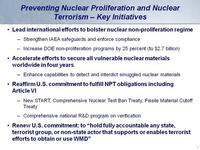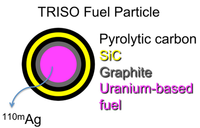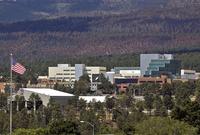-
Bolstering the safety, security of U.S. nuclear weapons
To improve the safety and security of nuclear weapons, specialists must weigh the risks and benefits of making intrinsic changes to the warheads (possibly degrading their performance) or pursuing external changes such as better access controls, according to experts. While improvements such as use of shock- and fire-resistant chemical explosives in the warheads could further decrease the risk of an accidental nuclear detonation or dispersal of plutonium, most of the experts who participated in a workshop on the issue were not greatly concerned about the safety level of the current U.S. nuclear arsenal.
-
-
“Go ahead, make my day”: Sheldon Adelson on how to deal with Iran
Casino mogul Sheldon Adelson says that the Obama administration’s negotiations with Iran will lead to nothing, arguing that the best negotiating tactics would be to launch a preemptive nuclear strike on unpopulated areas in Iran – accompanied by a threat to wipe out the entire population of Tehran if Iran refused to give up its nuclear program. Echoing Clint Eastwood, Adelson said that following the nuclear explosion in the desert, Obama should tell the Iranians: “You want to be wiped out? Go ahead and take a tough position and continue with your nuclear development.”
-
-
Turkey exposed Israeli spy network in Iran
Israel and Turkey used to be close allies, but the relationship began to deteriorate in 2003, when Recep Tayyip Erdogan became prime minister after his Islamic party won the parliamentary elections the year before. The relationship reached its low point in 2010, when nine Turks were killed by Israeli commandos on a ship carrying supplies to the Gaza Strip. This was also the year that Hakan Fidan became the head of Milli Istihbarat Teskilati, or MIT, the Turkish intelligence service. Fidan is known for advocating a closer Turkey-Iran relationship – the Wall Street Journal wrote that “he rattled Turkey’s allies by allegedly passing to Iran sensitive intelligence collected by the U.S. and Israel.” Stories now emerge that in early 2012 Turkey deliberately blew the cover of an Israeli spy ring working inside Iran to collect information on Iran’s nuclear program.
-
-
Costly DOE uranium processing facility questioned

The cost of a proposed Department of Energy’s uranium processing facility for nuclear weapons at theY-12 National Security Complex in Oak Ridge, Tennessee has increase nineteen times – from the original estimate of $600 million to $11.6 billion. If these estimates are accurate, the processing facility would entail one the largest investments in the U.S. nuclear weapons infrastructure since the Manhattan Project.
-
-
$5 million NSF grant focuses on nuclear threat inspection
Penn State University has received a 5-year grant from the National Science Foundation (NSF) and DHS for nuclear threat inspection, as part of a team led by the Massachusetts Institute of Technology and including Georgia Tech. The grant will help develop new systems and sensors that will help detect nuclear weapons, special nuclear materials, radiation dispersal devices, and related threats.
-
-
Preventing nuclear terrorism

Nuclear terrorism remains a real and urgent threat. Despite an array of mechanisms established to combat this threat, several serious problems persist, requiring relentless attention and actions by the United States, Russia, and other responsible nations. These problems include continuing nuclear security vulnerabilities in a number of countries and the continued incidents of illicit trafficking in nuclear materials, radioactive sources, and the various components.
-
-
Robust fourth-generation nuclear fuel withstands high-temperature accident conditions

A safer and more efficient nuclear fuel is on the horizon. A team of researchers at the U.S. Department of Energy’s Idaho National Laboratory (INL) and Oak Ridge National Laboratory (ORNL) have reached a new milestone with tristructural-isotropic (TRISO) fuel, showing that this fourth-generation reactor fuel might be even more robust than previously thought.
-
-
Rouhani says the Holocaust did happen, and that it was reprehensible – or does he?
Iran president Hassan Rouhani’s predecessor, Mahmoud Ahmadinejad, denied the Holocaust ever happened, and once a year convened a conference of Holocaust deniers in Tehran in which a sundry crackpots presented what they described as studies proving that the Holocaust was a Jewish myth. In a CNN interview yesterday, he said that “the crime that the Nazis committed towards the Jews, as well as non-Jewish people — is reprehensible,” but added that he would leave it to historians to judge the “dimensions of the Holocaust.” The official Iranian news agency Fars was quick to accuse CNN of mistranslating Rouhani’s words. It posted its own translation of Rouhani’s answer to CNN’s question, and claimed that he did not use the word “reprehensible” and that he said historians should be left to judge “historical events,” not “the Holocaust.”
-
-
Iran indicates willingness to rethink nuclear program in exchange for sanction relief
As part of a series of steps designed to present post-election Iran as more pragmatic, President Hassan Rouhani and his advisers indicated they would be willing to consider curbs on Iran’s nuclear program in exchange for relief from the crippling economic sanctions imposed on Iran. Some Western experts say that all these steps are more than mere cosmetic changes, while skeptics note that Obama has reached out to Iran before, with no results. Veterans of past nuclear negotiations with Iran also noted that it is likely that Rouhani’s team may not yet fully understand the kinds of concessions that the Islamic republic would be required to make to have the most painful economic sanctions lifted.
-
-
3D Earth model accurately pinpoints source of earthquakes, explosions
During the cold war, U.S. and international monitoring agencies could spot nuclear tests and focused on measuring their sizes. Today, they are looking around the globe to pinpoint much smaller explosives tests. Researchers are working on developing a 3-D model of the Earth’s mantle and crust called SALSA3D. The purpose of this model is to assist the U.S. Air Force and the international Comprehensive Nuclear-Test-Ban Treaty Organization (CTBTO) in Vienna, Austria, more accurately locate all types of explosions.
-
-
U.S. nuclear reactors vulnerable to terrorist attack: study
More than ten years after the 9/11 hijackers considered flying a fully loaded passenger jet into a Manhattan area nuclear reactor, U.S. commercial and research nuclear facilities remain inadequately protected against two credible terrorist threats — the theft of bomb-grade material to make a nuclear weapon, and sabotage attacks intended to cause a reactor meltdown. A new report finds that none of the 104 commercial nuclear power reactors in the United States is adequately protected — but among the most vulnerable are eleven reactors in California, Connecticut, Florida, Maryland, Massachusetts, Missouri, New York, North Carolina, Texas, and Virginia. One of these reactors, on the grounds of the National Institute of Standards and Technology (NIST), is among the three research reactors fueled with bomb-grade uranium, and is located in the Washington, D.C. suburb of Gaithersburg, less than twenty-five miles from the White House.
-
-
Gen. Dempsey: U.S. military options against Iran “better” than last year
General Martin Dempsey, the chairman of the Joint Chiefs of Staff who is on an official visit to Israel and Jordan this week, said that in his meeting with Israeli leaders he told them that “since I was here last year [October 2012], [the United States has] better military options than we did a year ago” to deal with Iran’s nuclear weapons program. “That’s because we’ve continued to refine them,” he said. “We’ve continued to develop technology, we’ve continued to train and plan.”
-
-
Small modular reactors (SMEs) a “poor bet” to revive U.S. nuclear renaissance: report
A shift to small modular reactors (SMRs) is unlikely to breathe new life into the troubled U.S. nuclear power industry, since SMRs will likely require tens of billions of dollars in federal subsidies or government purchase orders, create new reliability vulnerabilities, as well as concerns in relation to both safety and proliferation, according a report issued last week.
-
-
Nuclear academics, professionals meet for 6th annual ATR NSUF Users Week
The sixth annual Advanced Test Reactor National Scientific User Facility (ATR NSUF) Users Week was held 10-14 June at University Place, the satellite campus for Idaho State University and University of Idaho in Idaho Falls. This nuclear research-themed week was the user facility’s opportunity to update the user community on nuclear energy issues and tools, conduct a research forum where users can come and present their research, run specialized workshops, and build collaboration among academic, industry and government institutions.
-
-
Top-secret super-secure vault declassified

Down a remote canyon near Los Alamos National Laboratory lies a facility known as the Tunnel Vault. Once one of the most secret and secure locations in the United States, it is the original post-Second World War nuclear stockpile storage area. Built between 1948 and 1949, the facility has a formidable security perimeter, a hardened guard tower — complete with gun ports and bulletproof glass — and a series of gates and doors that lead to a 230-foot long concrete tunnel that goes straight into the canyon wall.
-
- All
- Regional
- Water
- Biometrics
- Borders/Immig
- Business
- Cybersecurity
- Detection
- Disasters
- Government
- Infrastructure
- International
- Public health
- Public Safety
- Communication interoperabillity
- Emergency services
- Emergency medical services
- Fire
- First response
- IEDs
- Law Enforcement
- Law Enforcement Technology
- Military technology
- Nonlethal weapons
- Nuclear weapons
- Personal protection equipment
- Police
- Notification /alert systems
- Situational awareness
- Weapons systems
- Sci-Tech
- Sector Reports
- Surveillance
- Transportation
Advertising & Marketing: advertise@newswirepubs.com
Editorial: editor@newswirepubs.com
General: info@newswirepubs.com
2010-2011 © News Wire Publications, LLC News Wire Publications, LLC
220 Old Country Road | Suite 200 | Mineola | New York | 11501
Permissions and Policies
Editorial: editor@newswirepubs.com
General: info@newswirepubs.com
2010-2011 © News Wire Publications, LLC News Wire Publications, LLC
220 Old Country Road | Suite 200 | Mineola | New York | 11501
Permissions and Policies
